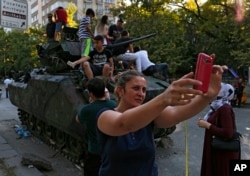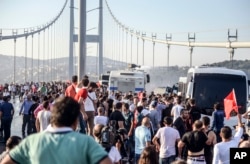Turkish President Recep Tayyip Erdoğan wasted little time Saturday before launching a purge of his enemies.
He promised on his arrival at Istanbul Ataturk Airport to punish the coup plotters who had tried to kill him.
“They will pay a heavy price for this,” said Erdoğan.
But he made clear he saw opportunity in Friday’s events. “This uprising is a gift from God to us, because this will be a reason to cleanse our army,” the president told supporters at the airport.
Few regional analysts doubt that he will now use the failed coup to strengthen his presidential powers and to cleanse not only the military but other institutions suspected of harboring opponents.
Growing purge
The first signs of a crackdown after a violent, chaotic night came quickly. As well as arresting nearly 3,000 soldiers who took part in the coup bid, authorities also suspended five generals and 29 colonels — although it remained unclear whether those officers were involved actively in the coup.
The government seemed to be intent on spreading the purge.
As well as the army, the judiciary appeared to be high on the target list. The government suspended more than 2,700 judges. The Ankara public prosecutor detained nearly 200 top court officials, the Anatolian News Agency reported. They included 140 members of the Supreme Court and 48 members of the Council of State, one of Turkey's three high courts.
Adding to fears that the government’s reaction to the coup would match Erdoğan’s threats and his record of ruthlessness, Prime Minister Binali Yildirim said the government was considering legal changes to bring the death penalty back “to make sure this does not happen again.”
The chances of another military coup being attempted anytime soon, though, would seem remote — especially in light of the quick collapse of Friday’s effort.
Little support
As the attempt unfolded, it became clear that the ringleaders did not have widespread support within the military, nor any serious political or public backing. None of Turkey’s opposition parties endorsed it, and even Erdoğan’s die-hard liberal and secular critics in the media and civil society denounced the action, saying Turkey had had enough of coups.
As gunfire, explosions and low-flying fighter jets created confusion in Ankara and Istanbul and left 265 people dead and more than 1,400 people wounded, top military leaders denounced the rebellion. The navy chief and special forces commanders spoke out against the coup plotters. The chief of staff, General Hulusi Akar, was not part of the coup, nor was the head of the army in Istanbul, who took overall command briefly while the plotters held Akar captive.
In two out of four previous coups in Turkey since 1960, the top military brass were involved and were able to use the chain of command to ensure success. Friday’s coup was a more narrowly based effort and appeared to have been carried out by small group of officers in the First Army. Some of the soldiers arrested Saturday claimed they thought they were taking part in military maneuvers and had no inkling they were participants in a coup until crowds of pro-Erdoğan protesters confronted them.
"This attempted coup collapsed before it started,” said Fadi Hakura, an analyst with Chatham House, a London think tank.
In many ways, the coup was a matter of smoke and mirrors. The plotters focused on the main government buildings in the Turkish capital — parliament, the residences of the president and prime minister, and military headquarters. In Istanbul, they closed down Bosphorus bridges and Ataturk airport. They briefly seized the state-run broadcaster TRT.
Key failings
But they failed to close down private broadcasters or other communication systems, allowing Erdoğan to rally civilian supporters using his cellphone and talking to private broadcasters NTV and CNN Turk. The plotters appeared to have launched the coup hoping that other military units would come to their support.
Above all, said military strategist Edward Luttwack, the ringleaders violated two key rules when mounting a coup. Writing in Foreign Policy magazine, he said: “Rule No. 2 in planning a successful military coup is that any mobile forces that are not part of the plot — and that certainly includes any fighter jet squadrons — must be immobilized or too remote to intervene. ... But the Turkish coup plotters failed to ensure that these loyal tanks, helicopters, jets were rendered inert, so instead of being reinforced as events unfolded, the putschists were increasingly opposed.”
Even more important, the plotters broke “Rule No. 1, which is to seize the head of the government before doing anything else, or at least to kill him.”
Now Erdoğan appears free to press on with shaping Turkish politics to his liking. His top target has already become clear — namely, the moderate religious movement of onetime ally, preacher and scholar Fethullah Gulen, whom the president has long accused of running a “parallel state” in Turkey from self-imposed exile in Pennsylvania. The government is demanding his extradition from the U.S.
Erdoğan said the coup attempt was carried out by a clique of Gulen supporters within the military — something the preacher and his supporters vehemently deny.







